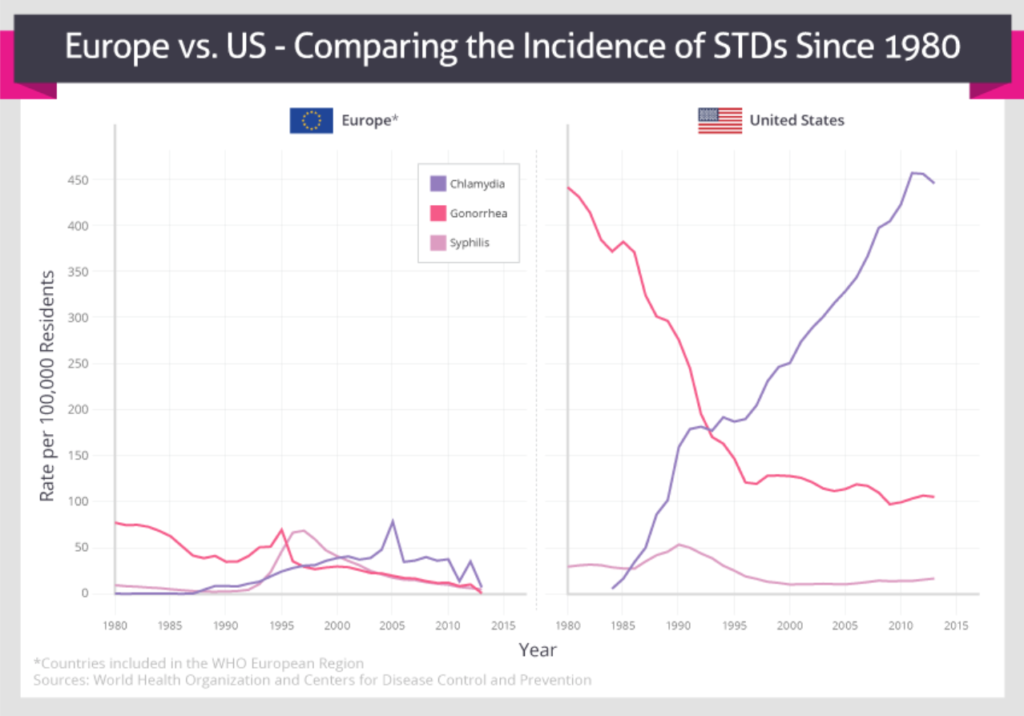
Photo Courtesy of Marie Claire
The rate of teenage pregnancy and the spread of sexually transmitted infections (STIs) in the United States are public health issues that urgently need to be addressed. Compared to other highly industrialized nations, the United States is significantly behind its peers in terms of high teen pregnancy rates. According to 2016 information from the World Bank, there were 21 births per 1,000 women aged 15-19 in the United States, compared to 14 in the United Kingdom and nine in both France and Spain. And as depicted by the graph below, the United States has a much higher incidence of STIs compared to countries in Europe. This means that in America, the number of new cases of STIs

Put simply, the first step that America needs to take is to implement comprehensive sex education in schools, not solely promote abstinence-only education. We need to be educating the public and keeping everyone well-informed about the sexual behaviors they are likely to engage in because it creates a safer environment for all parties involved, and it would decrease the likelihood of unwanted pregnancies and/or sexually transmitted diseases. The United States also needs to increase funding for programs that increase access to contraceptive resources and make STI screenings more affordable and available to the general public.
According to Planned Parenthood, comprehensive sex education includes topics related to “human development, relationships, personal skills (such as communication and decision-making), sexual behavior (including abstinence and sexual behavior throughout life), sexual health, and society and culture regarding gender roles and sexuality.” While abstinence is the only 100 percent effective way to prevent pregnancy and the spread of STIs, it is not realistic in the long run. Abstinence-only sex education does not prevent teen sex or teen pregnancy, it just keeps young people in the dark and leaves them unprepared for the real world. We should be funding comprehensive reproductive health education that teaches the pros and cons of sexual activity, as well as how to seek help and/or medical attention if necessary. Comprehensive sex education does not increase the number of sexually active individuals, but rather it encourages safe practices for those who are sexually active.
Additionally, there should be more national, state, and local programs that work to improve access to contraceptives and that work to destigmatize sexual behaviors in youth. According to a study by the Guttmacher Institute, as shown by the graph below, the percentage of high schools teaching various sex education topics has declined over the past few years. This same fact sheet states that only 22 states, along with the District of Columbia, mandate education about both sex and HIV, two states mandate only sex education, and another 12 mandate only HIV education. Only 18 states and the District of Columbia require that sex education initiatives include information about contraception, and only 12 states require that the information taught about sex and HIV be medically accurate. This is unacceptable.

Furthermore, sex education has a tendency to promote heteronormative ideas and values, which further discriminates against the LGBTQ+ community. The Guttmacher Institute’s fact sheet says that only 12 states require discussions surrounding sexual orientation in their sex education classes, nine of which require inclusive discussions, and three states (Alabama, South Carolina, and my home state of Texas) require that the classes only provide negative information about sexual orientation. This means that the laws of these three states require that teachers actively portray the LGBTQ+ community, and homosexuality specifically, in a negative or inaccurate way, which further stigmatizes this group and passes along false information to students.
Clearly, we need to do better as a nation. We need to provide all young people with the resources they need to make smart, healthy choices, and we should also reform individual state policies on sexual education and sexual health classes. Widespread misinformation and lack of information in general regarding reproductive health create a public health issue in the United States that is running rampant in our communities. We have the responsibility to promote public health in America, and that cannot even begin to be effective until we educate the public and increase access to resources that are needed to remain safe and healthy. When these steps are followed, the rates of teenage pregnancy, as well as the rates of STI transmission, are certain to decrease. It is time for the United States to “get with the times” and join its peers in promoting inclusive sexual and reproductive health.
Cassi Niedziela

Cassi, a staff writer at “In the Zeitgeist,” is a second-year student at NYU majoring in Global Public Health & Sociology and minoring in Politics and French Studies. She is originally from Glen Rose, Texas and has studied away in Washington, D.C., Paris, France, and Accra, Ghana. She currently interns at the Ghana Coalition of NGOs in Health in Accra and hopes to pursue a career that focuses on the intersection of public health, politics, and human rights in an international context. Her hobbies and interests include drinking extreme amounts of coffee, avidly following the news, and exploring NYC with her friends.



